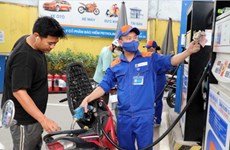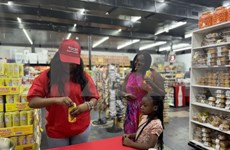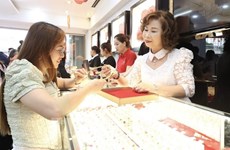Illegal access to export preferences via false origin claims tackled
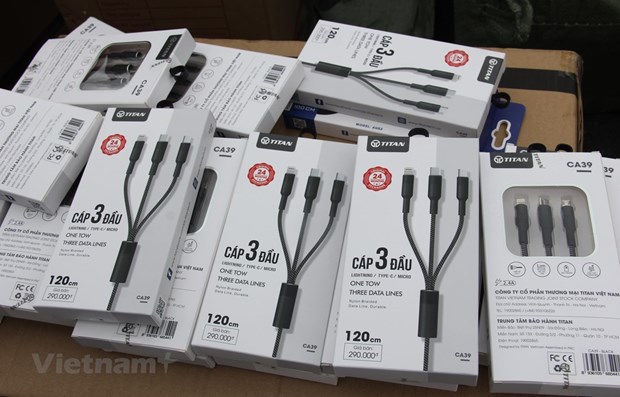
Mobile phone charger cords imported from China but labelled “Made in Vietnam”, seized by Hai Phong Customs in July 2019 (Photo: VietnamPlus)
Hanoi (VNA) - In signing up to a large number of free trade agreements (FTAs), Vietnam has a range of opportunities to attract FDI but must also promptly prevent fraud and misuse of the State’s incentives.
A number of businesses and individuals have incorrectly stated that goods are of the Vietnam origin in order to access export incentives.
Preventing policy abuse
Deputy head of the General Department of Vietnam Customs’ Post-Customs Clearance Inspection Department Tran Manh Cuong said Vietnam signing important FTAs with the US, the EU, and other countries and blocs has made FDI attraction more straightforward but posed challenges for State management agencies.
After its ongoing trade war with China broke out, the Trump administration in the US officially imposed taxes on various types of goods imported from China, amounting to 7.5-285 percent.
Several Chinese goods subject to additional taxes are also exported by Vietnam to the US and saw significant revenue increases, such as electronics, apparel, leather and footwear, interior wooden furniture, iron and steel, and solar batteries.
To prevent origin fraud, Cuong said the Prime Minister issued Decision No 824/QD-TTg dated July 4, 2019, approving a project on strengthening the State management over evading trade defence measures and fighting origin fraud, and Resolution No 119/NQ-CP dated December 31, 2019, containing urgent measures to enhance State management in preventing origin fraud and the transportation of illegal goods.
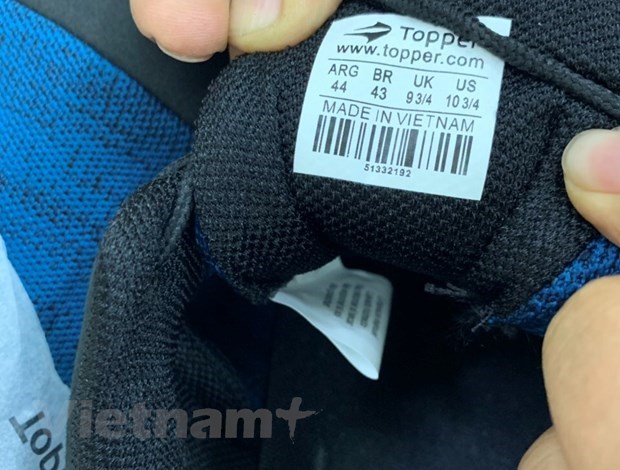 TOPPER shoes in a shipment temporarily imported from China for re-export to a third country but labelled “Made in Vietnam”, which were found and confiscated by Hai Phong Customs in May 2019 (Photo: VietnamPlus)
TOPPER shoes in a shipment temporarily imported from China for re-export to a third country but labelled “Made in Vietnam”, which were found and confiscated by Hai Phong Customs in May 2019 (Photo: VietnamPlus) Wrongdoings uncovered
In compliance with directions from the Government and the Ministry of Finance, the customs sector has embarked on activities to prevent origin fraud and illegal transportation.
Cuong said that via inspections, the sector uncovered several common methods of fraud. For example, “producers” invest little in their production lines and instead import semi- or fully-finished products and simply change the packaging. Other producers with a complete assembly line, meanwhile, do not have products eligible for legal export.
Since early this year, 76 cases have been inspected, 24 of which have been found violating regulations on export origin. The sector also partnered with the Ministry of Public Security to investigate a case regarding the forging of origin certificates, and seized 3,590 assembled bicycles and over 4,000 sets of spare parts and more than 12,000 sets of kitchen cupboard components.
Over 33 billion VND in funds were collected, including confiscated items and fines for administrative violations.
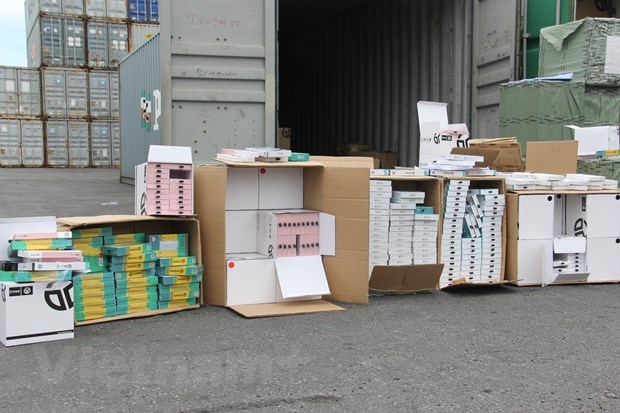 A container of mobile phone components imported from China but labelled “Made in Vietnam”, seized by Hai Phong Customs in July 2019 (Photo: VietnamPlus)
A container of mobile phone components imported from China but labelled “Made in Vietnam”, seized by Hai Phong Customs in July 2019 (Photo: VietnamPlus) Drastic measures applied
According to Cuong, the General Department of Vietnam Customs has set post-customs clearance inspection and investigation of origin fraud and illegal transportation as its major activity for this year and in subsequent years.
The Finance Ministry and the General Department of Vietnam Customs have adopted a number of concerted and drastic measures that have prevented the taking of advantage of provisions in FTAs Vietnam has signed to violate regulations on origin, which affects Vietnam’s ability to deliver on its commitments.
Cuong said the sector has basically controlled fraud relating to the origin of products exported to the US, such as bicycles, solar batteries, aquatic products, and wood and wooden furniture.
He added that the Finance Ministry should supplement regulations on calculating illegal gains by processing firms because the outsourcing is done outside of Vietnam but the violations are usually inside the country.
The Ministry of Industry and Trade should partner with the Finance Ministry and the customs sector to inspect the origin of exports and imports, and issue specific guidelines on labelling and origin self-certification to assist fraud prevention and punishment efforts, he suggested./.







